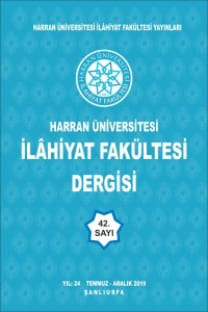KÖTÜLÜK PROBLEMİ: GAZALİ-SWINBURNE MUKAYESESİ
Kötülük problemi teist sistemler için en önemli problemlerden biridir. Bu makalede Gazali ve Richard Swinburne’ün doğal ve ahlaki kötülüklere dair değerlendirmelerini ele almaya çalışacağız. Gazali’ye göre, Tanrı’nın insanlar için uygun gördüğü her şey iyidir, onda bir yanlışlık yoktur. Meydana gelen olaylar mükemmeldir ve mümkün olanın en iyisidir. Bununla Gazali, kudret sahibi Tanrı’nın en iyi dünyayı yarattığını değil, dünyadaki bütün işleyiş göz önüne alındığında onun mümkün olan en iyiyi yarattığını iddia etmektedir. Richard Swinburne, sonsuz bilgi, kudret ve merhamet sahibi Tanrı’nın kötülüğe niçin izin verdiğini açıklamaya çalışıyor. O bunu daha çok özgür irade ile açıklamaya çalışmaktadır
The problem of evil is one of the most important problem for theist systems. This paper briefly tries to deal with the analyses and evaluations of al-Ghazali and Richard Swinburne about natural and moral evils. According to al-Ghazali, everything which God apportions to man is pure right, with no wrong in it. They are the most perfect and the best possible [decisions] and there is no way to act better and more adequately. al-Ghazali does not argue that our world is the best world God was able to create, but simply that the omnipotence of God has established for this universe the most perfect possible rules of functioning, even if He would have been able to produce infinitely different worlds. Richard Swinburne attempts to explain how evil can exist in a world created by an omniscient, omnipotent, omnibenevolent Being, namely God. Swinburne uses the free-will defense and argues that God provides us with a choice of doing good and of evil
- ISSN: 1303-2054
- Yayın Aralığı: Yılda 2 Sayı
- Yayıncı: Harran Üniversitesi İlahiyat Fakültesi
Sayıdaki Diğer Makaleler
DİN-BİLİM İLİŞKİSİNİ YENİDEN DÜŞÜNMEK: ANTONY FLEW’UN FİKİR DEĞİŞTİRMESİ ÜZERİNE
FARKLI AÇILARDAN KÖTÜLÜK PROBLEMİ
H. Madden EDWARD, Çevirmen: Sami ŞEKEROĞLU
KÖTÜLÜK PROBLEMİ: GAZALİ-SWINBURNE MUKAYESESİ
MU’TEZİLE : İSLÂM'IN AKILCI YORUMU -2
Josef VAN ESS, Çevirmen: Veysel KASAR
İBN RÜŞD’E GÖRE İDEAL DEVLET’İN BAŞKANINDA BULUNMASI GEREKEN NİTELİKLER
HARİCİLERDE MÜNAZARA VE MUHAVERE ÖRNEKLERİ
